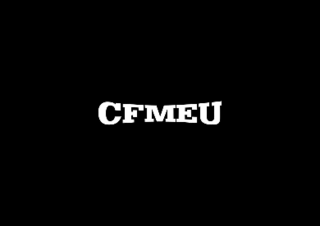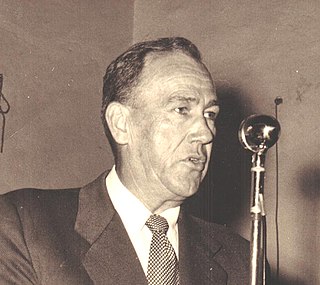
William Guthrie Spence, was an Australian trade union leader and politician, played a leading role in the formation of both Australia's largest union, the Australian Workers' Union, and the Australian Labor Party.
The Australian Workers' Union (AWU) is one of Australia's largest and oldest trade unions. It traces its origins to unions founded in the pastoral and mining industries in the late 1880s and it currently has approximately 80,000 members. It has exercised an outsized influence on the Australian Trade Union movement and on the Australian Labor Party throughout its history.

The Queensland Council of Unions (QCU) is a representative, an advocacy group, or peak body, of Queensland trade union organisations, also known as a labour council, in the Queensland, Australia. As of 2020, 26 unions and 13 regional branches were affiliated with the QCU. The QCU represents unions covering around 350,000 Queensland workers. It is affiliated with the Australian Council of Trade Unions (ACTU). Its offices are located in the suburb of South Brisbane, Queensland. As a peak body for the Queensland trade unions, the objective of the QCU is to achieve industrial, social and political justice for Queensland workers. The management structure of the QCU is made up of a committee of management and an executive of representatives comprised from affiliated unions.

The Construction, Forestry and Maritime Employees Union (CFMEU) is the largest union in construction, forestry, maritime, textile, clothing and footwear production. The CFMEU is affiliated with the Australian Council of Trade Unions and the Australian Labor Party.

Alexander Poynton OBE was an Australian politician. He held ministerial office under Prime Minister Billy Hughes, serving as Treasurer (1916–1917), Minister for Home and Territories (1920–1921), and Postmaster-General (1921–1923).

Clyde Robert Cameron,, was an Australian politician. He was a member of the Australian Labor Party (ALP) and served in the House of Representatives from 1949 to 1980, representing the Division of Hindmarsh. He was a leading figure in the Australian labour movement and held ministerial office in the Whitlam government as Minister for Labour (1972–1974), Labor and Immigration (1974–1975), and Science and Consumer Affairs (1975).
Donald Newton Cameron, Australian politician, was born in Murray Bridge, South Australia, and was educated at Gawler. Like his brother Clyde Cameron, he became a shearer and an official of the Australian Workers' Union, and was also active in the Australian Labor Party. From 1965 to 1969 he was South Australian state secretary of the AWU and a member of the Labor State Executive. He was elected to the Australian Senate in 1969 and served until his retirement in 1978.

John James McNeill was an Australian politician and trade unionist. He was a member of the Australian Labor Party (ALP) and served two terms in the House of Representatives, representing the Division of Wannon in Victoria. He was Minister for Health and Minister for Repatriation from 1931 to 1932, holding office in the government of his brother-in-law James Scullin.

Edward Grayndler was an Australian trade unionist and politician. He served as general secretary of the Australian Workers' Union (AWU) from 1912 to 1941, the longest term in the union's history.
Cesar Melhem is a former State Secretary of the Victorian Branch of the Australian Workers' Union (AWU), and a former Member for Western Metropolitan Region in the Legislative Council, Parliament of Victoria, between 2013 and 2022.

William Frederick Edmonds was an Australian politician and trade unionist from Queensland. He served briefly as state president of Australian Workers' Union (AWU) before his election to the House of Representatives at the 1946 federal election. He represented the Australian Labor Party (ALP) in the seat of Herbert until his defeat in 1958.
Harold Boland was an Australian shearer and trade unionist.

Donald Macdonell was a politician, trade unionist and shearer in New South Wales, Australia.
James Morton Toomey was an Australian trade unionist.

Francis Walter Lundie was an Australian trade unionist, long serving Councillor for Port Adelaide and the corporation of the city of Adelaide, board member of the Royal Adelaide Hospital, the Royal Zoological Society, the Port Adelaide literary society, The Worker and other newspapers, member of the Royal Commission into the South Australian pastoral industry 1927.

Tom Nicholson Pearce Dougherty, was an Australian trade union official and a member of the New South Wales Legislative Council. As National Secretary of the Australian Workers Union (AWU) from 1944 to 1972, he was one of the most powerful figures in the Australian labor movement and the Labor Party.

Fallon House is a heritage-listed trade union office at 1 Maryborough Street, Bundaberg Central, Bundaberg, Bundaberg Region, Queensland, Australia. It was designed by David Ballinger Goodsir and Harold James Carlyle and built in 1953 by Llewellyn Herbert Edwards. It was added to the Queensland Heritage Register on 7 December 2012.
The Pulp and Paper Workers Federation of Australia (PPWF) was an Australian trade union which existed between 1913 and 1991. The PPWF represented workers in the pulp and paper industry.
The Amalgamated Shearers' Union of Australasia was an early Australian trade union. It was formed in January 1887 with the amalgamation of the Wagga Shearers Union and Bourke Shearers Union in New South Wales with the Victorian-based Australian Shearers' Union, with William Spence as president and David Temple as secretary.
The Australian Shearers' Union was a significant but short-lived early trade union in Victoria and southern New South Wales. It was formed on 12 June 1886 at a public meeting at Fern's Hotel, Ballarat, to resist a proposed reduction of shearing rates in Victoria and New South Wales, with David Temple as secretary and William Spence as president. The union was headquartered at Creswick in Victoria. A Melbourne branch was formed in July. By November 1886, it claimed 5000 members: 1500 in Victoria and 3500 in southern New South Wales. Having sought to amalgamate with the various New South Wales unions from an early stage, it merged with the smaller Wagga Shearers Union and Bourke Shearers Union to form the Amalgamated Shearers' Union of Australasia in January 1887.












